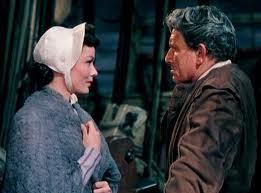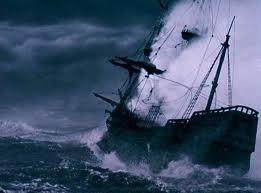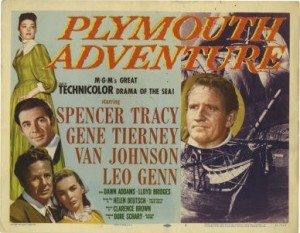All his other medieval and biblical films—Quo Vadis?, Ivanhoe, King of Kings, Ben-Hur, Julius Caesar, Sodom and Gomorrah and Knights of the Round Table—underwent this equally detailed research. He is an expert at scoring these historical dramas, much as he is in the quite different genre of film noir, where at one time he almost became typecast. Ironically, Rózsa last score was for a parody of film noir movies, Dead Men Don’t Wear Plaid, Steve Martin interacting with a compilation of clips from noir films of the 1940s.
There are, too, hidden away in the smallest of roles, those wonderful character actors who populate so many of the films of the 1930s and ’40s, even into the ’50s—such stalwarts as Cecil Kellaway, Guy Rolfe, Leo G. Carroll, Norma Varden, Alan Napier and Ian Wolfe.
Released in early 1953, Young Bess just missed out on being in CinemaScope, the new widescreen process first used in The Robe, which was released late that same year.
Don’t expect in Young Bess anything resembling today’s films. The 1998 Elizabeth, for example, though comparable in its span of English history, is replete with bloodbaths, graphic deaths and torture, erotic love scenes, dark, oppressive photography and an often overbearing score. A good film, yes, but so different. While Elizabeth practically tastes and smells of history, accurate or not, Young Bess is history as it might have been, idealized and romanticized, made “pretty.” Whatever the film may lack in, say, dramatic impact or literary cohesion, it more than makes up for in those contributions by Rosher, Gibbons, Plunkett and Miklos Rózsa. It clearly reveals, as Elizabeth does not, the joy of movie-making.
If my allegiance here seems divided, let me clarify: Young Bess is highly recommended. Many thanks to the folks at Warner Bros. for providing this review copy.
Plymouth Adventure (1952)
“By the time this voyage ends, this ship will contain not a hundred and two passengers and thirty crewmen, it’ll contain one hundred and thirty-two cats and dogs, a hundred and thirty-two rubbing beasts.”—Captain Jones to Dorothy Bradford
WB Archive’s release of Plymouth Adventure shares with Young Bess the same art director (Cedric Gibbons), costume designer (Walter Plunkett) and composer (Miklós Rózsa), though not cinematographer Charles Rosher, who here is replaced by an even greater one, William Daniels. Working against these positives, a different director, Clarence Brown, may account for the sluggish tempo of the film. In fact, after Miklos Rózsa’s grand and exultant setting of the Pilgrim-period hymn “Confess Jehovah Thankfully” from the main title chorus, the rest of the film is pretty much, at least esthetically, downhill.
Plymouth Adventure, actually made by M-G-M in 1952, is the story of the approximately two-month voyage of the “Mayflower” from England to what ended up being Cape Cod, although the Pilgrims thought their destination was the Virginia Colony. The movie is something of a history lesson, and would be a good start for students ignorant of the basic chronicle, though a history lesson is seldom a reason for going to the movies. Early on, before the “Mayflower” has set sail, John Dehner gives Van Johnson (John Alden standing in for a presumed uninformed audience) some background on the story—where the Pilgrims are going, their search for religious and political freedom, etc.
 The movie is encumbered by a love story subplot between the ship’s captain, Christopher Jones (Spencer Tracy), and the attractive Dorothy (Gene Tierney), wife of William Bradford (Leo Genn), though the actress is seldom dressed or photographed flatteringly, hampered by a tight-fitting bonnet and a gray milieu. Tierney was twenty years younger than Spencer Tracy, who thanks to his drinking, looked at least fifteen years older than fifty-two.
The movie is encumbered by a love story subplot between the ship’s captain, Christopher Jones (Spencer Tracy), and the attractive Dorothy (Gene Tierney), wife of William Bradford (Leo Genn), though the actress is seldom dressed or photographed flatteringly, hampered by a tight-fitting bonnet and a gray milieu. Tierney was twenty years younger than Spencer Tracy, who thanks to his drinking, looked at least fifteen years older than fifty-two.
“I was making that goddam Plymouth Adventure,” Spencer Tracy remembers in a conversation with Garson Kanin, “and my ulcer was kicking up. . . . My face looked like it could hold three days of rain. Anyway, there we stood playing the scene and this lovely kid, Gene Tierney, had to look up and say to me, ‘I love you. I love you.’ . . . What the hell will the audience make of this idiocy? This sensational young beauty looking up at this cranky old man and saying all this bullshit. The only reason she was saying it to me was because I was a big Metro star playing the lead in the picture.”
At the outset, Captain Jones is the cliché nasty guy, the guy we’re expected to hate during the movie, and we’re well prepared to do so. He is bribed by Mr. Weston (Rhys Williams, astonishingly uncredited!) to deliver the Pilgrims to the wrong coast, and eyes Dorothy as she boards his ship. Angry throughout much of the voyage, he slowly, clearly begrudgingly, softens in his regard for his passengers, presumably because of his love for this woman, who inexplicably—not convincingly justified by the script—returns his love, though, as she tells him, it is a different kind of love from what she feels for her husband. Thoroughly “converted” as it were, Jones even delays his return to England, contrary to the deal he had made with Weston, offering the “Mayflower” as a refuge for the raw settlers during the harsh winter. Bradford is aware of his wife’s betrayal and the two men become shoulder-patting friends.
 The highlight of the movie, despite the acting, which is uniformly competent, sometimes excellent, is the North Atlantic storm that lashes, nearly capsizes, the “Mayflower.” So good, in fact, that the recreation won an Oscar for Best Special Effects. From 1951 through 1953 this category was for single films, sans nominees. In any case, Plymouth Adventure presumably “beat out” that year the train wreck in The Greatest Show on Earth. When an enormous beam supporting the upper deck splits, letting in torrents of water, the Pilgrims offer their screw printing press to raise the beam so that supporting timbers can be wedged in place.
The highlight of the movie, despite the acting, which is uniformly competent, sometimes excellent, is the North Atlantic storm that lashes, nearly capsizes, the “Mayflower.” So good, in fact, that the recreation won an Oscar for Best Special Effects. From 1951 through 1953 this category was for single films, sans nominees. In any case, Plymouth Adventure presumably “beat out” that year the train wreck in The Greatest Show on Earth. When an enormous beam supporting the upper deck splits, letting in torrents of water, the Pilgrims offer their screw printing press to raise the beam so that supporting timbers can be wedged in place.
If one can bear the slow pace, the sometimes talkie script and that implausible main love story—there’s also a thinly written one between Alden and Priscilla Mullins (Dawn Addams)—sit back and enjoy the adventure, Miklos Rózsa’s music and, if you’re not as informed as you should be about this early stage in America’s settlement, learn something from this snatch of history.
